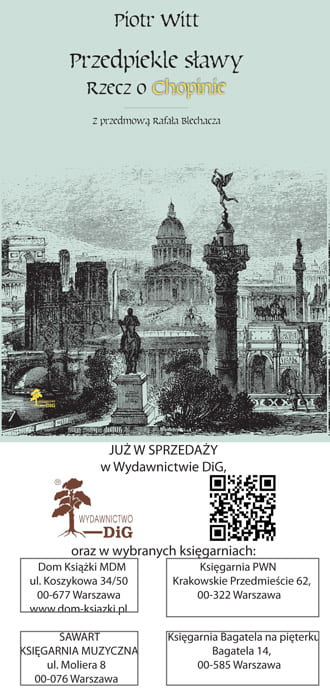Piotr Witt is a noted writer and historian who, for many years, contributed commentaries and essays for international radio broadcasts of Radio Free Europe. Mr. Witt’s latest work is a fascinating book examining the origins of Chopin’s tremendous success in Paris. With an excellent title—Przedpiekle sławy [Fame: The Antechamber of Hell]—this work was originally published in 2010 by the Ministry of Culture and National Heritage in Warsaw in connection with Chopin’s bicentennial. Now, this volume has gone to a second edition, published by Wydawnictwo DiG and enriched by an introduction from Rafał Blechacz, winner of all the top prizes at the 2005 Chopin Competition in Warsaw.
Mr. Witt’s work concentrates on Chopin’s first months in Paris in the early 1830s. It was a difficult period for Chopin and all Parisians—an epidemic of cholera claimed over twenty thousand victims and the city was almost empty. The author successfully argues—with plenty of fascinating evidence quoted—that the turning point for Chopin’s fortunes came with his December 30, 1832 performance at the Hotel de Monaco, the opulent palazzo occupied by Austrian Embassy in Paris. The Embassy’s New Year’s Eve concert series was an event firmly established on social calendar of Parisian elites. Several great artists, including Rossini and various Italian singers were present and Chopin’s unusual blend of virtuosity and tenderness held the Parisian belle monde spellbound. This performance established Chopin’s credentials as a pianist and composer and the rest, as the saying goes, is history. You can read more about this little-known episode in Mr. Witt’s excellent book.
[Sources: katalog.nukat.edu.pl, facebook.com]
